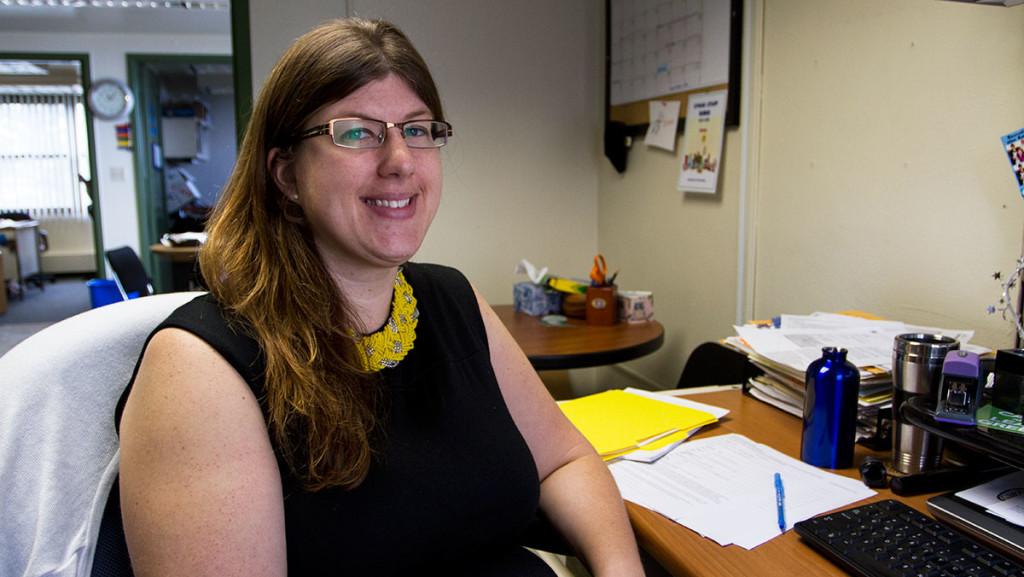Ithaca College’s Title IX Coordinator, Tiffani Ziemann, has created new plans and committees for the 2016–17 academic year to raise awareness about sexual assault and gender discrimination at the college.
The two new committees will begin meeting this semester and include faculty, staff, student and community representatives from the Advocacy Center of Tompkins County — a local nonprofit that provides support and education for survivors of domestic violence.
One of the new committees is the Policy, Procedures and Practices committee. The committee will meet every other week to make sure procedures and policies at the college comply with Title IX, Ziemann said.
Procedures that will be looked at include the Student Conduct Code and reporting procedures for sexual harassment and assault. The policies that will be reviewed include study–abroad travel policies and training policies for volunteers or alumna on campus.
The committee has about 12 members, Ziemann said. The faculty and staff members include Dawn Kline, assistant dean in the School of Business; staff members from legal affairs and the Office of Public Safety and Emergency Management; Sean Eversley Bradwell, director of programs and outreach in the Division of Educational Affairs; Luca Maurer, program director of the Center for Lesbian, Gay, Bisexual and Transgender Education, Outreach and Services; and Ziemann.
“We tried to get a broad scope of people who interact with campus in different ways to be able to look at practice and policy in different areas,” Ziemann said.
Two Student Governance Council members — Emily Honen, School of Humanities and Sciences senator, and Charlotte Robertson, off-campus senator — have also joined the committee. Honen said the reason she joined the committee was to help break down the social stigma regarding reporting sexual assault.
“Title IX is trying to make assault victims more comfortable with reporting assault, and that is where I believe SGC comes in,” Honen said. “I believe that with student inputs and liaisons, we can help make all victims more comfortable and ultimately decrease the amount of invisible or unreported assaults at Ithaca College.”
The Sexual Assault Prevention Programming Committee is also new this semester and was created with the goal of planning larger-scale programming initiatives, such as bringing in speakers and planning events that focus on campuswide education, Ziemann said. This committee is more student-focused and brings together staff members and leaders from clubs, such as Active Minds and Feminists United.
“We’re looking at the bigger picture — that Title IX isn’t just about sexual assault or sexual harassment, but there are elements of gender discrimination and other forms of sexual violence,” Ziemann said.
Along with the new committees, Ziemann has been working on developing an online learning module that is similar in concept to AlcoholEdu. Topics that will be included in the program cover sex in college, partying smart, sexual violence and healthy relationships. It mixes learning through reading information, scenarios and interactive questions, Ziemann said.
The college plans to do a soft rollout to current students in the spring and get feedback before officially setting up the module as a requirement for incoming students in the fall, Ziemann said. New students will get notifications about the requirement through an email explaining how to access the program and making clear the deadline for when the program should be completed. Unlike AlcoholEdu, the Title IX online module will have refresher courses students can take throughout their four years at the college.
The idea for an online educational program has been brought up in the past by students, and just this year, funding made it possible to develop the program, Ziemann said. The office has contracted with a company called CampusClarity, which creates online training modules for students. CampusClarity is in the process of putting Ithaca College–specific information into the module, such as the link to the college’s Title IX website and Ziemann’s contact information.
The college is following a national trend of creating an online sexual–assault awareness program. CampusClarity’s courses are used by 1,300 colleges and universities in the country and reach over 5 million students, faculty and staff, said Michele Collu, demand generation manager for CampusClarity.
In the last month, the office of Title IX has also set up a contract with CampusClarity’s partner company, LawRoom, to create a similar online training module for faculty and staff, which would focus on sexual harassment, diversity and workplace behavior.
Ziemann was present at the Oct. 3 SGC meeting, where she outlined the Title IX plans for the 2016–17 academic school year. SGC named Title IX as one of the most important issues for the council to pursue this year. SGC President Marieme Foote said the SGC also plans to form its own internal committee that focuses on Title IX and gender discrimination.
With the new efforts from Title IX and the office’s work alongside the SGC, Ziemann said she is hopeful this year will increase student awareness toward Title IX.
“I’m really excited for this year,” Ziemann said. “I think this will be a year that students will start, hopefully, seeing a lot more about education, prevention and reporting options.”








